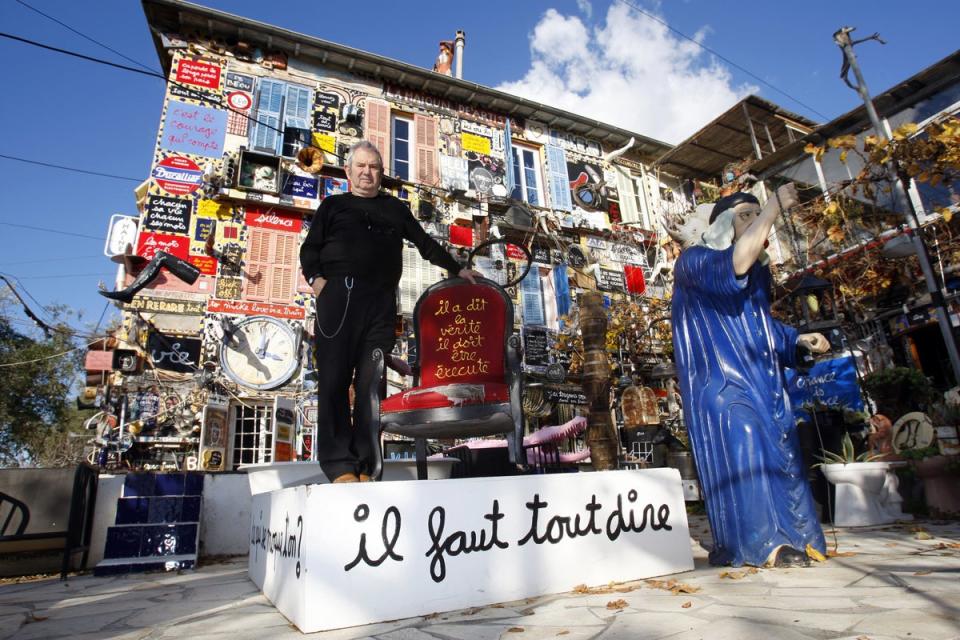French artist Ben Vautier, 88, dies by suicide hours after wife’s death

French artist Ben Vautier, 88, died by suicide at his home in Nice just hours after the death of his wife Annie, 85, his family said on Wednesday.
“Unwilling and unable to live without her, Ben killed himself a few hours later at their home,” their children Eva and Francois said.
The couple had been married 60 years.
The Nice prosecutor’s office said Vautier, known professionally as Ben, was found with a gunshot wound and that they would open an investigation into his death, reported ArtNews.
He was associated with the Fluxus movement, which sought to disrupt what was considered art and endorsed the idea that “everything is art”.
Vautier incorporated the phrase into several of his works and his performance art during the 1960s and 1970s was often deliberately unconventional.
He once convinced a theatre he would stage a play by Molière but instead smashed pianos. In a separate piece, he urinated into a jar and then exhibited it as artwork.
In another, he rammed his head against a wall over and over again.
“On our children’s pencil cases, on so many everyday objects and even in our imaginations, Ben left his mark, made of freedom and poetry, of apparent lightness and overwhelming depth,” France’s president Emmanuel Macron said in a statement on the artist’s death.

Vautier was born in 1935 in Naples, Italy, and lived in Turkey, Egypt and Switzerland with his mother after his parents divorced. He moved to Nice when he was 14 and spent the rest of his life there.
“I was very sad because my father went away with my brother who was one year older than me and I was separated from my brother,” he said in a 2023 interview to Forbes.
“I think I must have been traumatised because I made a kind of wall. When the family meets and everybody talks about their childhood, I never talk about my childhood, yet if I want to, I can force myself to remember things.”
Vautier did not do well in school and started working in a local bookstore, where he had his first memorable experience with art. He would cut out portions of books he liked and create collages on a wall at home.
By the time he was 20, Vautier said he had decided that “art must be new”, a belief that caused his interest in and alignment with the Fluxus movement.

He was known for being happy to sign whatever he wanted and then subsequently claiming it as his creation.
“My art will be an art of appropriation. I seek to sign everything that has not been signed. I believe that art is in the intention and that it is enough to sign,” he once said.
Vautier was considered an opportunist and dilettante by many within the art world for his refusal to see art as something borne from training and talent as well as for his opinion on museums. He once hung a banner over Germany’s Fridericianum museum during the 1972 edition of the Documenta art festival that read “Kunst ist überflüssig,” or “Art is superfluous”.
However, Vautier always insisted that behind the jokes he intended a serious message that provoked thought or even a fight.
“I am not a money machine, but a communication machine,” he said.
Among his most notable and most replicated pieces were his humorous slogans, which he usually painted in white on a black background, asking: “What is the use of art?”, “Is the new always new?”, “What are you doing here?”
The phrases ended up in New York’s MoMa, on school bags, notebooks, the steps of the tramway in Nice, and the pencil cases Macron referred to.
“The world of culture has lost a legend,” French culture minister Rachida Dati said on social media, describing the departed artist a “goldsmith of language”.
“His humorous, sometimes satirical writings have accompanied and marked generations. We will miss his free spirit terribly, but his art will continue to make France shine throughout the world.”
If you are experiencing feelings of distress or are struggling to cope, you can speak to the Samaritans, in confidence, on 116 123 (UK and ROI), email jo@samaritans.org, or visit the Samaritans website to find details of your nearest branch. If you are based in the USA, and you or someone you know needs mental health assistance right now, call or text 988, or visit 988lifeline.org to access online chat from the 988 Suicide and Crisis Lifeline. This is a free, confidential crisis hotline that is available to everyone 24 hours a day, seven days a week.
If you are in another country, you can go to www.befrienders.org to find a helpline near you.


